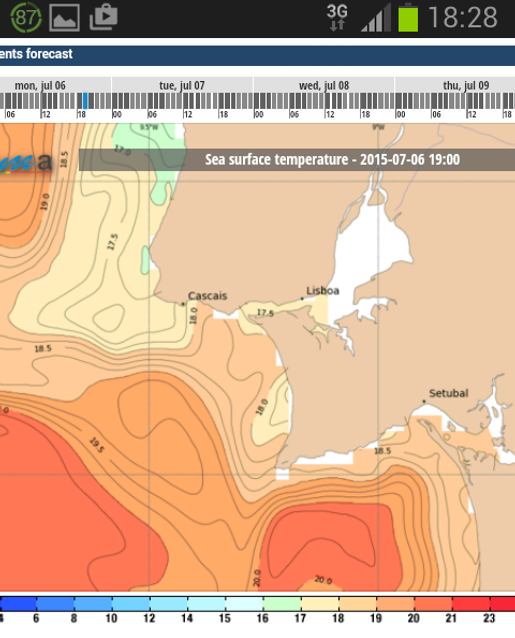
The beach at Carcavelos on a Friday afternoon in August. Sea temperature recorded as 20°c, ideal for bathing in comfort.
is the sea cold?
What are your thoughts on the ocean temperature experienced at the beaches in Portugal?
6 July 2015
The natural phenomenon of upwelling - when cold, deep water is brought to the shore - can cause a significant decrease in sea temperature. But also the opposite, downwelling, can occur.
In 2015, I wanted to understand the exact temperature of the ocean, so I bought a simple thermometer (the kind you can use in a swimming pool) and every time I swam in the ocean, I took it with me. I recorded the sea temperature almost every day in June, July, August and September.
The results surprised me. As shown below, the Instituto Português do Mar e da Atmosfera (IPMA) state the ocean temperature is 18.5°c at Costa da Caparica and 18.0°c at Fonte da Telha, Sesimbra, Sesimbra and Tróia.

This screenshot shows the predicted sea surface temperature for 6 July 2015.
In stark contrast, my thermometer registered ocean temperature at Fonte da Telha on 6 July 2015 as 22.5°c. The following day, 7 July, the ocean temperature in Sesimbra was 20°c. From 8 July, in Tróia, it was 22°c every day. Whenever I swam in the ocean, the water felt warm, like a bath.

There is a striking discrepancy between the IPMA values and those I personally measured: IPMA sea tempearture predictions are much less in value; perhaps the answer is because their measuring buoys are located many miles out from the shore, in deep water.
Another day, this time in August 2015, at Praia da Bela Vista, between Costa da Caparica and Fonte da Telha, the digital water thermometer showed 20.5°c.
These ocean temperatures are excellent.
But that soon changed: later in the season when the Nortada (north wind) blowed for days, the ocean temperature dropped to 16°c (it felt a bit chilly to bathe) in just one day. A month earlier, on the same day, at the same beach, the water was 22°c. An ocean temperature of 16°c is 6 degrees cooler. That said, with air temperature peaking at 32°c, the sea is perceived as refreshing rather than freezing cold.
Traditionally, many tourists believe that only the Algarve has warm seas. Ocean temperature is a complicated affair: currents on the exposed westerly coast can be strong with big waves.
Geography does not, in itself, offer the solution. One assumes the further south one goes, the warmer the water. This is not always true. The coldest water I have bathed in was at Vila Nova de Milfontes, in the southwestern Alentejo, where the water was just 16°c. A few miles north of there, at Praia do Malhão, the water felt warm, registering at 19°c. Thirty miles north of there, at Praia da Galé, the water was deliciously warm at 20.5°c. And twenty miles north of there, at Tróia, Comporta and Carvalhal, the ocean was 22.5°c.
How is it possible for the water temperature to change so dramatically?
The Portuguese coastline – along with the coastlines of California, South Africa, Western Australia and Peru – is subject to a phenomenon known as upwelling.
In simple terms, if the wind blows parallel to the coast, then water from the bottom of the ocean (cold and rich in nutrients) rises and comes to the shoreline. This often occurs when the Nortada blows during the summer and is why the ocean can be cool in some places. It seems the Nortada is at its strongest in August, when anywhere on the coast can have cool water. The early summer - June and July - seem to offer the best bathing conditions.
The opposite of upwelling is downwelling, when the reverse occurs: on days when a southerly wind blows, warm water that heats up quickly under the strong sun remains against the coast.
The answer to the question “Is the Sea cold in Portugal?” is both yes and no. It all depends on a variety of factors. But as my experiences above prove, the ocean temperature in Portugal is often warmer than the official figures published. Even in the north of the country – near cities like Figueira da Foz – I have found warm water (20.5°c).

